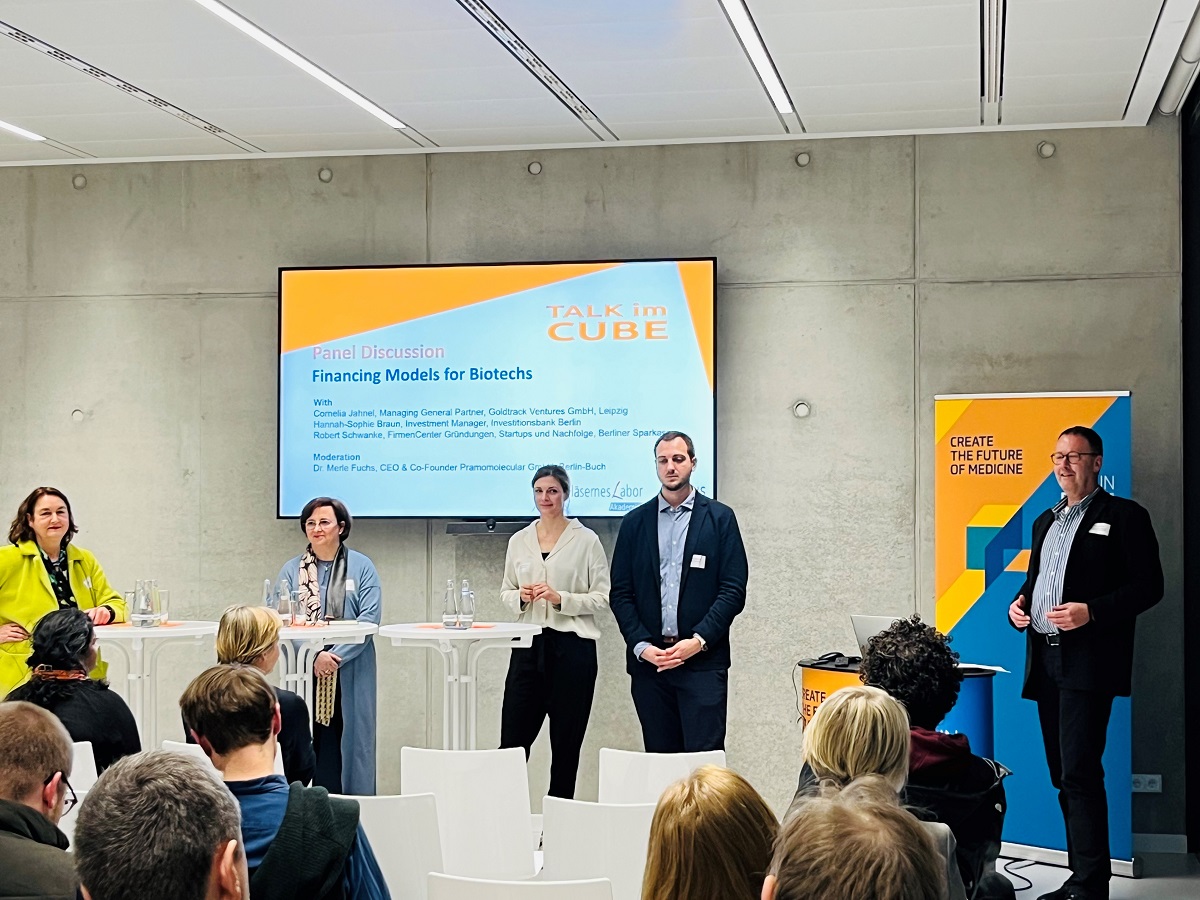
News
Inspiring and connecting: “Talk im Cube”
09.12.2024 / For almost a year, “Talk im Cube” has been bringing science and business together on the Campus Berlin-Buch

Since last February “Talk im Cube” regularly invites to exciting panel discussions followed by networking. The compact format is aimed at the campus community, scientists, start-ups and investors in Life Science. The Talks 2024 highlighted topics such as Female start-ups in the life sciences”, exit strategies, bridging preclinical to clinical or cancer drug development from a treating oncologist’s perspective.
An inspiring “Talk in the Cube” on financing models for start-ups took place on 28th November.
Merle Fuchs, CEO and cofounder PRAMOMOLECULAR GmbH, Berlin-Buch discussed with Cornelia Jahnel, GOLDTRACK Ventures GmbH, Leipzig, Hannah-Sophie Braun, Investitionsbank Berlin and Robert Schwanke, Berliner Sparkasse the challenging fields of Biotech financing options, financing trends for biotechnology in Europe and ways for Biotech Start-Ups to find successful funding strategies.
What do VC investors expect from start-up teams?
Putting together a team for a successful spin-off is a learning process for scientists who want to found a company. Cornelia Jahnel and Hannah-Sophie Braun agreed that science and business must be mapped: Either someone has the market knowledge or is willing to acquire it or is willing to bring someone into the team who has these skills. Furthermore, someone on the team should keep an eye on the milestones and the final business goal.
How do you successfully get in touch with VC investors?
This question is essential for founders in the life sciences and the panelists made the following recommendations:
Small investment conferences and pitches help to get feedback such as: Am I still too early? Contact via LinkedIn and presentations at international conferences are a good option – for example biotech conferences in Riyadh, London or in Saxony, such as the Finance Days in Leipzig. Thinking internationally is important for start-ups, even though conferences are very expensive for them, while VC investors don't have to pay for them. To be able to assess which conferences are important, one should see which ones your competitors are attending.
If Start-ups are looking for contact with VC investors, they could be supported by Business angels who have excellent contacts and are highly professional.
Further important advices:
- Pitch whenever you can to enlarge your network.
- Whenever you can, ask for introductions or referrals from third parties when contacting investors and try to avoid “cold inquiries”.
- It is essential to learn Story Telling and to condense information you want to provide. Keep in mind: Most of the VC investors are not experts in your field – therefore starting to explain how to cure a patient with your invention instead of starting to delve into the depths of the technology.
Female founders
Women in C-level positions and as founders are currently rare are rare but the times are changing. There are more and more female managers at biotech funds and VCs are trying to support women for start-ups and leading positions. Role models need to be established and well-balanced, diverse management teams, i.e. with women / men in different age groups are key for being successful.
What is the best way to start?
Robert Schwanke and Merle Fuchs are convinced that both the Business Plan Competition and the Science for Life Competition are very good starting points for receiving early feedback and entering the ecosystem.
Hannah-Sophie Braun recommended mentoring programs such as the Creativ Destruction Lab (CDL) to get support with fundraising.
Merle Fuchs emphasized the need to go abroad as a high-tech start-up and recommended, for example, the Boston Incubator, which was very helpful for her company's development.
The tendency for programs such as Biolabs from the USA to come increasingly to Europe, was also discussed.
How can the German and European market become more attractive for VC?
Cornelia Jahnel is convinced that funds are needed as role models and that this will change the market: “That's why we are setting up a fund. It can't all be about state funding (EXIS, EXIST 1, EXIST 2...). Instead of grant thinking: Big Thinking! We go out to attract VCs from the US and Scandinavia. We in Germany tend to be risk averse, but there is a shift.”
Hanna-Sophie Braun confirmed this: “Large parts of the companies are moving to the USA, including some of the teams, and we need to be active here.”
Networking and feedback
Hanna-Sophia Braun finally remarked: “Networking is important, but choose the right funds and get feedback as often as possible from people who are more experienced than you.”
Cornelia Jahnel added: “Regardless whether you are fundraising or whether you plan to start a business: Mingle in different groups to share your ideas, to share how it went, to share what was good and what didn't work for you.”
Talk in the Cube - Outlook for 2025
The next Talk in the Cube is scheduled for 20 February 2025 on the topic “Intellectual Property Strategies in Life Sciences” – with the European Patent Attorneys Dr. Sun Jin Lee (Maiwald GmbH) and Dr. Oliver Ladendorf (Kraus & Lederer PartGmbB). More information and registration shortly here: https://lnkd.in/dF9sfq6a
Other topics planned for 2025:
- International cooperation and funding programs in Life Sciences
- Life Science Marketing: ways to promote your products
- CROs in diagnostics and therapeutics development